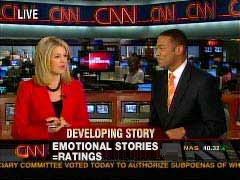Emotional response.
Thursday, February 7th, 2008
 I’m starting to take it personally that local news and 24 hour cable news—which I certainly had a small part in and made a living from—adding moving colors, shapes, and typography over the years—is not only unwatchable, but is verging on the toxic.
I’m starting to take it personally that local news and 24 hour cable news—which I certainly had a small part in and made a living from—adding moving colors, shapes, and typography over the years—is not only unwatchable, but is verging on the toxic.
A news consultant (who I went to school with, if memory serves), offers this tidbit to would-be reporters in this morning’s ShopTalk (read by lotsa TV folk):
Ask questions that elicit an emotional response
Facts are easily written into the script. What’s not easy to convey in a script is emotion. That’s what the soundbite is for. In doing an interview, reporters and photographers should ask a question that will elicit some emotion, and the response is what should be used in the story.
This explains a lot of what I’ve been seeing, and I wonder where the heck consultant-boy got that idea, because we sure didn’t learn in journalism school that our job was to elicit or extract emotion…to sidle up to interviewees and figure out how to leech every bit of emotion—true or otherwise—from their souls. There must have been some seminar—in the mid-80s?—that established new rules that I missed.
But it explains a lot.
I think somewhere along the line the idea that storytelling requires an emotional component got miswired into the DNA of a generation of broadcast journalists.
Sure stories can carry an inherent sense of tragedy (as Super Tuesday’s tornado deaths do), but to go on and revisit that tragedy again and again…to fly out the next day and go live, literally picking through the pieces of people’s lives for a moment or two of “good television,” well, my emotional response is that’s just sad..for us, for journalism. Yes, I’m looking at you, CNN Newsroom.
The consultant (a “morning news specialist”!) even offers examples of good soundbites and bad…the bad ones, in his book, are the ones where the interviewees just give you the facts of the story. The good ones, the ones you are supposed to wring out of exhausted fire chiefs, would be like this: “I had 6 of my guys on roof. I wasn’t about to let them get hurt, which is why I pulled them off right away. It scared the heck out of me when we heard that explosion! I sure was relieved when I saw all six standing safely on the ground!”
Where is my giant padded polo mallet of common sense when I need it?
What happens, of course, is that we have a media-savvy generation of people who have watched too much of this crap (and movies that have much the same) and they end up giving reporters precisely what they’re looking for—something that seems as if it conveys emotion, but is probably recycled dialogue from last night’s CSI. This cycle, of course, feeds on itself, and here we are.
So. Where do I sign up for a 24 hour news channel whose mantra is to offer Maximum information, Minimum emotion? BBC World News and the News Hour with Jim Lehrer only get you so far, but in the midst of our spreading TV substance drought, you take what cool water you can get.

